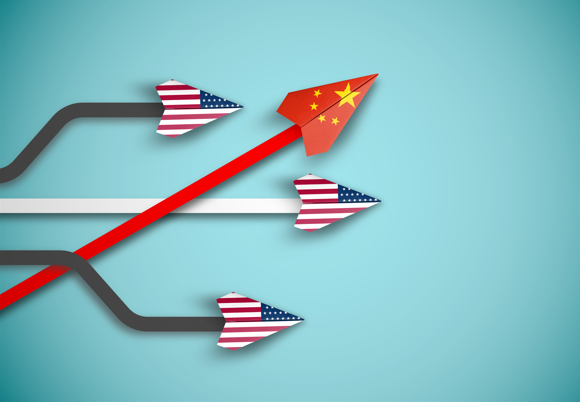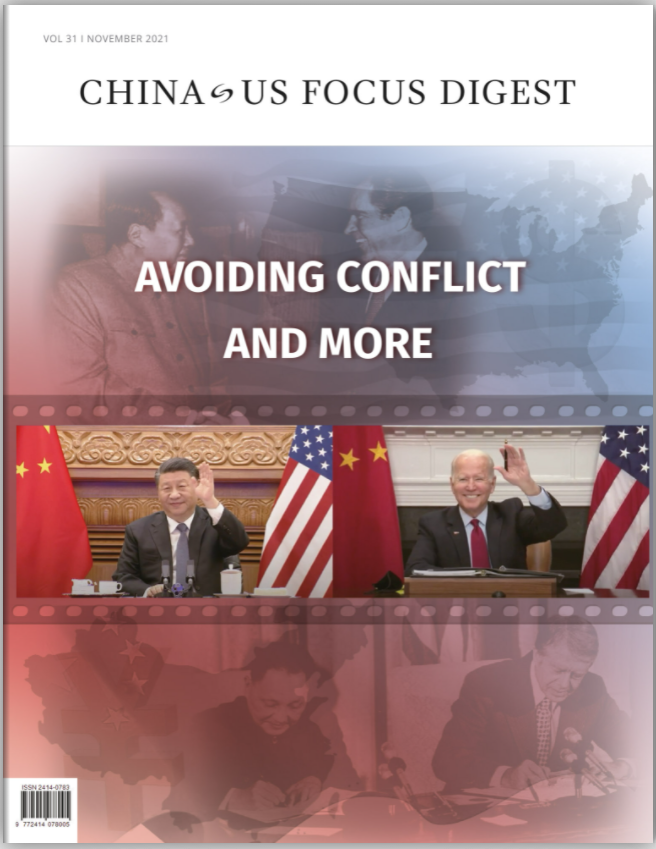
During Barack Obama’s second term as president of the United States, some scholars began to argue that the China-U.S. rivalry would soon trigger a new cold war. Since then, the U.S. has had two more presidents, and yet a new cold war has not occurred.
Still, despite the assurances of the countries’ leaders that they intend to avoid such a war, many people insist that it’s coming soon. Since the Chinese and American governments cannot seem to reach a consensus on the nature of bilateral relations, it is worth discussing whether Sino-U.S. competition is now a de facto “new cold war” or an “uneasy peace.”
Ideological expansion, proxy wars and the implied threat of nuclear weapons are what have characterized a cold war. Nuclear deterrence, which prevented war between the United States and the Soviet Union, is having the same impact in the Sino-U.S. rivalry. Meanwhile, Chinese ideology hinders its global expansion, as political populism in the U.S. prevents the American government from advancing liberalism in the world.
Therefore, the current U.S. administration under President Joe Biden finds itself trying to prevent the shrinkage of Western democracy rather than expanding it globally. That is why Sino-U.S. ideological conflicts are unlikely to escalate into war. As long as China adheres to the principle of peaceful reunification with Taiwan, there may be a slight chance that China and the U.S. could fall into a proxy war. But when the two giants do not pursue ideological expansion through such wars, their competition can hardly be called a cold war.
Click to read the latest issue of China-US Focus Digest
A cold war is a type of war — a proxy war for ideological expansion — rather than a type of peace. This is why the relatively peaceful period between the two world wars was never categorized as a cold war. The U.S.-Soviet Cold War was a particular rivalry between superpowers. It did not happen before World War II and has not been repeated. It is more akin to the Spring and Autumn and Warring States periods in Chinese history, which are two different types of strategic competition among major powers. The former was for hegemony and the latter for annexation. That’s why the Warring States period has never been categorized as new or as a second Spring and Autumn. All major power competitions are the same in nature, namely contending for power. But the features are different in each historical period.
Because Sino-U.S. competition is taking place in the digital age, it differs substantially from the Cold War of the past between the U.S. and the Soviet Union. The differences include space, content, strategy and decisive factors of competition. It would be more accurate to define it as uneasy peace rather than hot war or cold war. Their competition will be carried out in both natural space and cyberspace, but competition in cyberspace is more confined.
Competition will intensify, but there is only a slight chance of war between China and the U.S. Uncertainty is the main feature of their competition, which covers the whole world with strategic fear.
In the digital age, mutual nuclear deterrence is able to prevent China and the U.S. from falling into war in the natural space, as it did in the case of the earlier U.S.-Soviet rivalry. Meanwhile, competition in cyberspace will not cause large-scale casualties as traditional war does. Although cyberattacks may bring substantial economic damage, war in the natural space is unlikely.
In this age, the digital economy accounts for a major part of national wealth. Broadly defined, the digital economy accounts for more than half the GDP of the U.S. and nearly 40 percent of China’s. Neither ideological expansion nor proxy war can help China or the U.S. increase, let alone create, national wealth more than digital technology innovation. It is true that major powers in history have initiated many wars for occupying territory or seizing natural resources for the sake of obtaining economic wealth. Nevertheless, data has become the major economic resource in the digital age and digital innovation turns data into wealth, which generates wealth faster, and to a greater degree, than any other approach.
More important is the fact that, as an economic resource, the character of data is opposite that of natural resources. The former accumulates through consumption while the latter is reduced. This implies that economic competition will not drive China and the U.S. to war, including a proxy war. In the digital age, the core of national security is cybersecurity rather than territorial security. No war, including proxy war, can improve cybersecurity.
In 2021, Sino-U.S. tension over the Taiwan issue intensified. Many people believe that an accidental exchange of fire in the Taiwan Strait will trigger a war. However, the virtual summit of the two presidents in November effectively reduced that danger. This fact shows that the summit hotline can prevent proxy war from adding to the geopolitical competition between China and the U.S. That result also implies that it is easier for China and the U.S. to prevent a proxy war than to manage mutual cyberattacks. In any event, cyberattacks will not bring about a new cold war.
Uncertainty is the most prominent feature of international politics in the digital age. The digital economy, cyberattacks and social media jointly form that feature. The digital economy accelerated the pace of social polarization, increasing ordinary people’s discontent with their governments. Cyberattacks enlarge domestic political divisions and confrontation. Social media based on digital technology is able to shape anti-government public opinion instantly.
Thus, when the three digital factors dramatically increase the uncertainty of threats to regime security, foreign policymaking is more often driven by regime security than by national security. Because of the fact that regime security is less certain than national security, the age of uneasy peace comes to be dominated by uncertainty.
In short, Sino-U.S. strategic competition is more accurately characterized as an uneasy peace, rather than a new cold war. It is less possible for a shooting war to occur between China and the U.S., but the two countries will remain in dread of each other in the coming decade.

